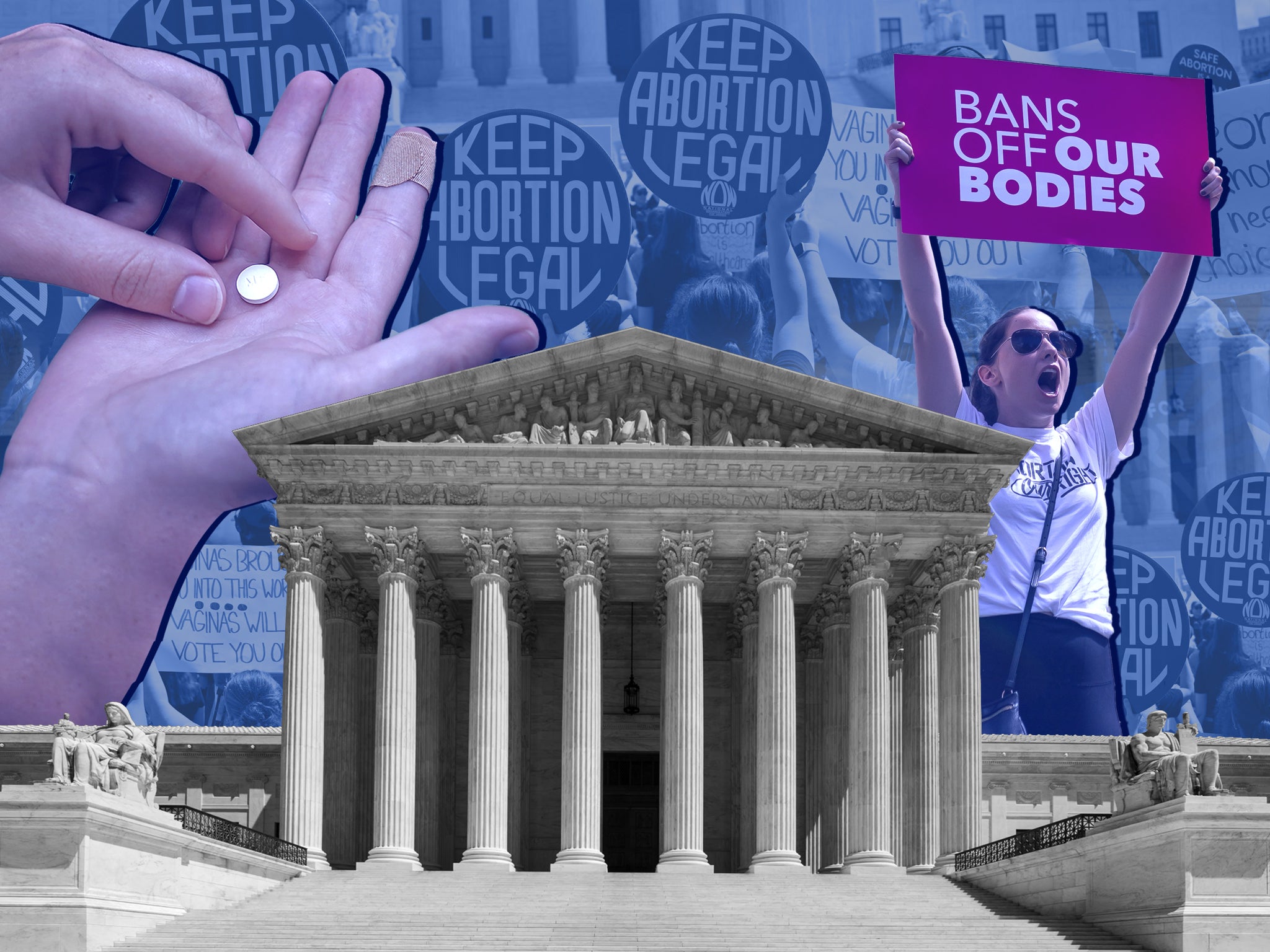What is mifepristone? The widely used pill in the abortion rights battle at the Supreme Court
The drug is used in more than half of all abortions in the US and is considered overwhelmingly safe, writes Alex Woodward


Even before the US Supreme Court’s decision to overturn Roe v Wade in 2022, anti-abortion activists and Christian conservative legal groups were taking aim at medication abortion, the most common form of abortion care in the US.
The Supreme Court’s ruling in Dobbs v Jackson Women’s Health Organization revoked a constitutional right to abortion care that was affirmed by the case of Roe v Wade nearly 50 years earlier.
In the months that followed, more than a dozen states have effectively outlawed abortion care altogether, or implemented severe restrictions that have complicated access to abortion for millions of Americans. All of those states have separate laws targeting medication abortion, and at least 15 other states restrict access to the procedure.
The Supreme Court returned to abortion rights with a challenge from anti-abortion activists to reverse the federal government’s approval of mifepristone, a widely used drug for medication abortion procedures and miscarriage care.
Justices are considering a pair of cases targeting the Food and Drug Administration’s approval of the drug, but a move to strip the government’s approval could devastate access to abortion and miscarriage care for millions of Americans across the country, including in states where access is legally protected, and potentially open the door for activist-driven challenges against other life-saving drugs.
What is mifepristone?
A medication abortion procedure typically consists of a two-drug protocol of mifepristone and misoprostol. Mifepristone is used in more than half of all abortions in the US.
The drug was first approved for use by the US Food and Drug Administration in most cases up to 10 weeks of pregnancy in 2000. A vast majority of abortions occur within the first nine weeks of pregnancy. From 2019 through 2020, nearly 93 per cent of all abortions were performed before the 13th week, according to the US Centers for Disease Control and Prevention.
Mifepristone is also used to treat miscarriages. Roughly 10 per cent of clinically recognized pregnancies end in miscarriages, according to the American College of Obstetricians and Gynecologists.
The drug blocks the hormone progesterone, which helps support the uterus. A healthy uterine lining supports a fertilized egg, embryo and fetus. Without progesterone, the uterus will expel its contents.
Roughly 24 to 48 hours after a patient takes mifepristone, the patient then takes misoprostol, which helps empty the uterus.
Last year, the FDA permanently lifted the in-person requirement for medication abortion prescriptions, allowing patients to access the drugs via telehealth appointments and online pharmacies so patients can take the drugs from the comfort of home.
The FDA also has approved a generic version of the drug that its manufacturer GenBioPro says makes up two-thirds of the US market.
Last year, Republican lawmakers across the US filed dozens of bills to restrict the availability and distribution of abortion drugs, while abortion rights advocates, President Joe Biden’s administration and Democratic members of Congress sought to bolster their availability.

Major medical groups and research from hundreds of studies over the last two decades have confirmed the overwhelming safety and efficacy of the drug. Studies show it is as safe to use as common over-the-counter pain relievers like ibuprofen and acetaminophen, and the protocol for medication abortion is used in more than 60 other countries.
The American College of Obstetricians and Gynecologists and the American Medical Association also signed a brief in the latest case opposing the challenge from anti-abortion groups.
How did the drug end up at the Supreme Court?
In November 2022, the right-wing legal group Alliance Defending Freedom filed a lawsuit in US District Court in Amarillo, Texas on behalf of a group of anti-abortion activists incorporated as the Alliance for Hippocratic Medicine, which was organised that same month with an address in Amarillo.
The Alliance Defending Freedom also led the challenge at the Supreme Court that ultimately struck down Roe v Wade.
US District Judge Matthew Kacsmaryk – a former right-wing activist lawyer who was appointed to the federal judiciary by Donald Trump – later issued a ruling to suspend the FDA’s approval of mifepristone. His order was set to take effect a week later, pending a decision from on appeal. But in a separate ruling in Washington state, a federal judge ruled that the FDA cannot change the status quo when it comes to mifepristone’s approval, setting up potentially duelling decisions over the drug.
Abortion rights advocates, providers, major medical groups and legal analysts condemned the ruling, and the US Department of Justice and Danco Laboratories, which manufactures mifepristone, filed an appeal.
That appeal landed at the US Court of Appeals for the Fifth Circuit, which has jurisdiction over the Amarillo court.
A three-judge panel on the Fifth Circuit blocked a part of the judge’s ruling, but upheld his ruling to strike down mail-in prescriptions and rules that expanded the drug’s approval for use up to 10 weeks of pregnancy.
An a
What will the Supreme Court do?
On 21 April, 2023, the Supreme Court blocked the lower courts’ rulings from taking effect while the case returned to the appeals court.
The Fifth Circuit argued that the FDA unlawfully approved mifepristone, setting up an appeal to the Supreme Court, which argeed to hear oral arguments in the case on 26 March.
Justices on the conservative supermajority court – on which all six conservative members agreed to reverse Roe v Wade – are considering consolidated cases against the Alliance for Hippocratic Medicine: FDA v Alliance Hippocratic Medicine and Danco Laboratories v Alliance Hippocratic Medicine.
The court will consider whether the anti-abortion activists who sued the FDA to overturn its 2016 and 2021 approvals of mifepristone have the standing to do so, and whether the FDA’s actions are “arbitrary and capricious.”
Arguing before the court are attorned for the Biden administration and Alliance Defending Freedom.
Can the FDA just ignore the ruling?
That’s what several members of Congress have argued, though President Joe Biden’s administration and abortion rights advocates have stressed that the case must play out in court and affirm the FDA’s ability to make such decisions.
Democratic senator Ron Wyden, the chair of the Senate Finance Committee, which oversees the FDA, has repeatedly argued that the administration ignore a ruling that undermines the FDA’s regulatory powers.
US Rep Alexandria Ocasio-Cortez has argued that an increasingly partisan-driven federal judiciary weaponised by right-wing activist groups has undermined its legitimacy in making such decisions.
Republican US Rep Nancy Mace also has suggested that a ruling that revokes the FDA’s approval of the drug should be ignored or tossed out.
What happens if mifepristone is not available?
Abortion providers and civil rights groups have warned of grave consequences to the loss of widely used abortion drugs from the market.
Providers could turn to a misoprostol-only medication abortion regimen, though that would be considered an “off-label” pharmaceutical use for the drug in the US. Misoprostol is currently approved by the FDA for the prevention and treatment of gastric ulcers but also is administered for other obstetric or gynecologic care.
Several Democratic-led states are stocking up on mifepristone and proposing legal protections for pharmacists and providers who dispense the drug.
A ruling that undermines the FDA’s drug approval process could also open the door for other activist-driven legal battles over other drugs, potentially inviting other destabilising lawsuits to Covid-19 vaccines, contraception, HIV medication, gender-affirming care, and other life-saving drugs.
This story was first published on 20 April 2023 and has been updated with developments
Join our commenting forum
Join thought-provoking conversations, follow other Independent readers and see their replies
Comments



Bookmark popover
Removed from bookmarks